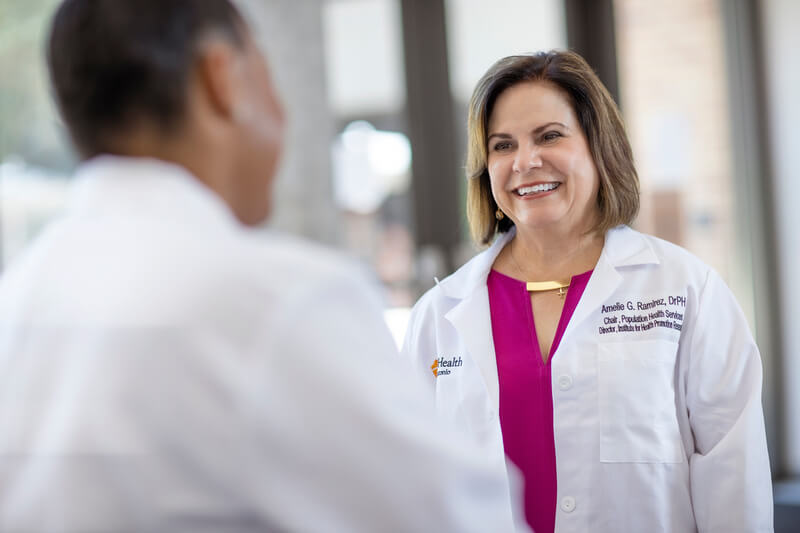
Share On Social!
This content is from the “Advancing the Science of Cancer in Latinos: 2024 Conference Proceedings.”
Task Force: Latino Researchers Against Cancer
This session occurred at 11:15 a.m., Friday, Feb. 23, 2024, at the 4th biennial Advancing the Science of Cancer in Latinos conference.
Dr. Amelie Ramirez is Professor at the University of Texas (UT) San Antonio, Director of the Institute for Health Promotion Research, Chair of the Department of Population Health Sciences at UT Health San Antonio, and Associate Director of Cancer Outreach and Engagement at Mays Cancer Center.

Dr. Ramirez’s presentation focused on communicating the mission and first year results of the Task Force: Latino Researchers Against Cancer (TFLRAC). The Task Force’s mission is to meet quarterly for 2 years to dialogue and identify critical issues and recommendations to address the burden of cancer in Latinos by providing insight and informing debate on current and emerging cancer issues impacting the Latino community, which in turn, benefits the full cancer community. The Year 1 (2023-24) goal was to explore the causes and multilevel drivers of health impacting the Latino cancer experience. The Year 2 (2024-25) goal is to provide specific recommendations for interventions to address these causes based on scientific evidence to reduce the burden of cancer in US Latinos and all people.
In Year 1, two overarching questions were considered: 1. Why do we think cancer has become the first cause of mortality among US Latinos? 2. How can we address the unique issues contributing to disparities in cancer incidence, mortality, and survivorship among US Latinos?
The Task Force identified 5 categories of factors affecting cancer in Latinos: factors directly causing cancer, factors affecting health, factors affecting the understanding of cancer, factors limiting support for cancer patients, and factors affecting the entirety of the cancer continuum.
Factors directly causing cancer include environmental factors and genetic factors. Pollution, toxic waste, agriculture and construction job exposure, secondhand smoke, and other factors associated with pollution affect Latino individuals and all people. Genetic factors associated with heritage are also present, underlining the need for more research and more gene sequencing.
Examples of factors affecting health are background and linguistic factors, health behaviors, access to nutrition, and access to healthcare. The language hurdle, combined with a lack of understanding of Familismo, Fatalismo, Machismo, and Marianismo can limit communication and connection between provider and patient. Low levels of health insurance coverage are also a major concern, with 18.3% of the US Latino population being uninsured.
Factors affecting the understanding of cancer mainly involve clinical trial design and participation. Only 2.8% of participants in phase I clinical trials for anticancer agents are Latino. Furthermore, clinical trial design must account for heterogeneity.
One factor limiting support for cancer patients is a lack of prevention and early detection. Patient education, cancer screenings, and enrollment in insurance programs are best achieved at the community level, but the main barrier to this support is cost. Empowerment and resources are also lacking for cancer patients. Finally, survivorship and end-of-life care for this community is often overlooked.
Factors affecting the entirety of the cancer continuum include policy and industry engagement and resources. Cancer centers and the Cancer Moonshot Program are a potential avenue for positive change, but policy can do more to empower cancer patients through improved access to resources and support. The industry can also be a powerful agent of change through funding clinical trials, health literacy, and education.
In Year 2, the Task Force plans to build on Year 1 results by formulating specific, evidence-based recommendations aimed at reducing the cancer burden in Latino and all communities. Critical areas include improving patient education, healthcare access, Latino participation in clinical trials, and action for change. Beyond recommendations, the Task Force in Year 2 hopes to lay groundwork for practical implementation – through collaborative efforts among academia, healthcare, government, and industry – for real-world impact and a more favorable healthcare landscape for Latinos, which benefits the whole population.
Pharma Panel: Investing in Latinos’ Health
This session occurred at 11:30 a.m., Friday, Feb. 23, 2024, at the 4th biennial Advancing the Science of Cancer in Latinos conference.
Genentech
Dr. Veronica Sandoval with Genentech.

Genentech is committed to being an industry leader by driving scientific innovations that enhance outcomes for its people, patients, business, and communities.
The AIR Site Alliance initiative aims to expand the participation of all people in clinical research, ensuring all patients benefit fully from personalized healthcare solutions. The AIR Site Alliance demonstrates significant impact: Black and Latino patients enroll two times faster than at other study sites. Additionally, the six AIR oncology sites achieve an 80% more reflective patient population compared to their study peers, while the three AIR ophthalmology sites achieve a 48% higher reflectivity. Genentech collaborates closely with the AIR Site Alliance sites to co-create educational resources, including patient and healthcare professional videos, to improve representation.
Genentech also sponsors community-based health improvement symposia nationwide, focusing on healthcare differences and local solutions to advance health. Initiatives like Fiesta Fairs and Univision Health Fairs provide vital services such as vision and cancer screenings and promote public health literacy among the community, raising awareness about cancer and chronic disease risks.
Bristol Myers Squibb
Dr. Constanza Kurman Petrozzelli is with Bristol Myers Squibb.

Bristol Myers Squibb (BMS) is addressing the need for greater [participation] in clinical trials by taking a holistic approach. For the Organization for Latino Achievement (OLA) program, this begins with a better understanding of the needs of Latino patients, assessing healthcare provider behaviors, strengthening their presence in the community, outreach, and enrollment efforts. The OLA team partners with BMS’s DiCT program to ensure the participation in clinical trials is more reflective of the real-world population and aligned with the epidemiology of the disease studied. This involves intentionality in site and investigator selection, protocol design considerations, communication and engagement, patient support, training, and metrics and measures.
At an annual workshop, issues to clinical trial participation were discussed. Strategies included prioritizing availability of consent forms translated in Spanish, expanding trial eligibility criteria, providing nurse navigators to sites, simplifying the trial process to reduce administrative burden, and incorporating principle investigators serving patients in the trial design process.
Despite efforts to increase clinical trial participation, much of the research and corresponding action plans paint the community in broad strokes and fail to recognize the varying degrees to which one’s background impacts the patient experience. BMS has the potential to make a meaningful impact by helping with issues, such as financial assistance with treatment and health education efforts, and specifically designing resources.
Gilead
Dr. Jesse Garcia is with Gilead.

Gilead seeks to grow for greater impact by bringing transformative therapies to patients. It also aims to be the biotech employer and partner of choice and deliver shareholder value in a sustainable, responsible manner. Ambitions for this growth span three therapeutic areas. In virology, Gilead seeks to end the HIV epidemic; eliminate hepatitis C and advance options for hepatitis B and D; and continue reducing the burden of COVID-19. In oncology, through a partnership with Kite Pharma, Gilead’s goal is to change how cancer is treated through cell therapy, offering remission and potential for cures for many more people. This involves delivering transformative therapies in 20+ indications, impacting 500,000 patient lives, and being a top 10 oncology company by 2030. In inflammation, Gilead seeks to advance new treatments to help people living with a range of inflammatory and fibrotic diseases.
Beyond medicine, Gilead believes that their innovation will impact patients most when [challenges] to care are removed. In fact, the company’s global priorities include helping to enable access to life-changing medicines, delivering scientific innovation, and igniting impact for the communities we serve. Gilead, which is the top global philanthropic funder of HIV causes, provided $260 million in funding to community organizations in 2022. Furthermore, Gilead has partnered with 127 low- and middle-income countries on access to medicines and building sustainable health systems and has committed $10 million to organizations [addressing root causes for all people].
AstraZeneca
Kemi Williams, MBA, is with AstraZeneca.
AstraZeneca is committed to designing clinical programs with uniqueness at the forefront through data-driven continuous improvement, innovative solutions, and effective external partnerships. Because incorporation is critical from discovery to delivery, AstraZeneca is increasing clinical trial participation so trials better reflect the patients who may use their medicines.
Project Ignite set out to identify the challenges and opportunities to improve participation of patients in chronic kidney disease and breast cancer studies. After extensive global and national research, 6 insights were identified to guide future research across the company. First, successful research sites separate background and other patient issues and tailor support accordingly. Next, sites that do well support patients according to their non-medical drivers of health. Sites can also recruit faster when incorporation of people from overlooked populations have been considered in the study design and recruitment strategy. Some low-income patients may require support that relies on site infrastructure and resources. Local sites are better positioned to lead the engagement based on community needs. Finally, local research sites can accelerate recruitment with sponsors that consult the sites upfront on patient backgrounds.
One successful partnership to address care and clinical trial participation has been the American Cancer Society (ACS) National Breast Cancer Roundtable (NBCRT). As part of the Cancer Moonshot program, objectives include strategic partnerships to address issues and reduce mortality, ensuring access to quality screening and treatment, and addressing needs of patients and their families. AstraZeneca has been approached to become the industry sponsor of this program.
AACR Special Session – Overcoming Hurdles: Progress and Challenges in Shaping the Future of Cancer Research, Care, and Policy for All Populations
This session occurred at 8:15 a.m., Friday, Feb. 23, 2024, at the 4th biennial Advancing the Science of Cancer in Latinos conference.The panel featured Drs. Amelie G. Ramirez, Mariana C. Stern, Ruben Mesa, Jon Retzlaff, and Rajarshi Sengupta.
This panel discussion focused on the potential partnership between Advancing the Science of Cancer in Latinos (ASCL) and the American Association for Cancer Research (AACR). The AACR is committed to reducing cancer issues, partially through its MICR initiative.
The AACR has been hosting a conference on health gaps since 2007. The AACR Report Series is an initiative with the goal of educating members of Congress, the public, and the scientific community about cancer gaps and the importance of medical research. This initiative also pushes for increased federal funding for health-focused research. Since 2019, the AACR has received $15.3 million in funding from 10 industry and foundation partners to support research.
By The Numbers
142
Percent
Expected rise in Latino cancer cases in coming years




[…] Read Full Article: […]